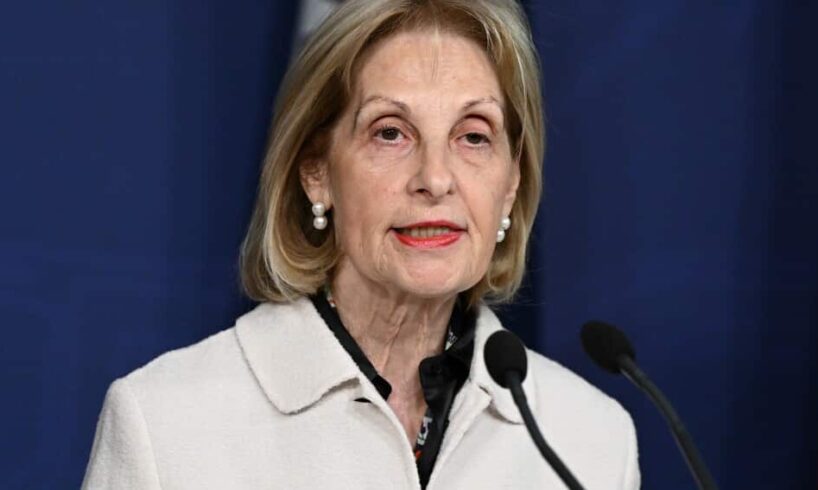
Australia’s special envoy to combat antisemitism, Jillian Segal, has dismissed criticism of the definition of antisemitism used in a plan to combat antisemitism she has recommended the government implement.Albanese says he will consider the plan’s recommendations but has not committed to it in full.The report relies on a definition of antisemitism from the International Holocaust Remembrance Alliance (IHRA), written by United States historian Kenneth Stern.
He has since distanced himself from the definition, arguing it too closely conflates criticism of Zionism and Israel with antisemitism.
International human rights organisation Amnesty International said it rejects the IHRA definition “that has been widely criticised for being used to silence legitimate criticism of Israel’s genocide against Palestinians, and its abhorrent human rights record”.
“The IHRA definition emboldens governments to stifle growing opposition to Israel’s ongoing genocide in Gaza, its brutal and unlawful occupation, and its system of apartheid that is a crime against humanity,” the group said in a statement.
Divide over report’s antisemitism definition
Some have raised concerns the definition used could be “inappropriate” for the government to adopt into law and lead to heavy-handed silencing of free speech and criticism of actions of the state of Israel.Segal said those critics misunderstood the definition.”The train has moved on, if I might put it that way, and Kenneth Stern has been left behind,” she told ABC Radio National on Friday.
“The definition in its own terms clearly says if Israel is criticised, that’s absolutely fine, and indeed so many Israelis are criticising the policies of their own government. But if you are calling for the elimination of the state of Israel, then that is antisemitic.”
Max Kaiser, executive officer of the Jewish Council of Australia — a progressive group critical of Israel’s actions in Gaza — labelled Segal’s report a “blueprint for silencing dissent” and his organisation said the emphasis on surveillance, censorship and punitive control over funding was “straight out of [Donald] Trump’s authoritarian playbook”.Other Jewish groups, including the Executive Council of Australian Jewry (ECAJ) and the Australia/Israel & Jewish Affairs Council have called for the plan to be adopted in full.”Its release could not be more timely given the recent appalling events in Melbourne. The actions which the plan call for are now urgently needed,” ECAJ president Daniel Aghion said in a statement.”We call upon all sectors of society, including government, law enforcement, the media, the university sector, education authorities and online platform providers, to co-operate with the Special Envoy and the Jewish community to give this action plan full force and effect.”
IHRA’s definition, finalised in 2016, states: “Antisemitism is a certain perception of Jews, which may be expressed as hatred toward Jews. Rhetorical and physical manifestations of antisemitism are directed toward Jewish or non-Jewish individuals and/or their property, toward Jewish community institutions and religious facilities.”
Definition is ‘vague and overbroard’, legal expert says
Ben Saul — chair of international law at the University of Sydney, and UN special rapporteur on human rights and counter terrorism — said the definition is “inappropriate … vague and overbroad” and “not workable”.”It’s not consistent with international human rights law because it imposes excessive restrictions on legitimate freedom of expression,” he told SBS News.”The definition was never intended to be a legal or regulatory enforcement tool. It was only designed to be a monitoring and awareness-raising tool.”Saul said the definition provides examples that would likely be misinterpreted and if they became legally binding in Australia would lead to punishment of “legitimate freedom of expression”.”The International Court of Justice has said there is racial segregation or apartheid happening in Israel’s occupied territories, and the IHRA definition says you can’t call Israel a racist endeavour. So that’s clearly a contradiction with well-accepted international human rights standards,” Saul said.An advisory opinion handed down by the International Court of Justice last July found Israel is depriving Palestinians “of the enjoyment of the natural resources of the territory” and “diverting a large share of the natural resources to its own population”, which it said was “tantamount to the crime of apartheid”.
Israel has repeatedly rejected this claim.
It recommends strengthening legislation to counter “hateful and intimidating conduct”, including serious vilification offences, the public promotion of antisemitic sentiment, and the display of Nazi symbols. A national database would be created to ensure consistent recording of antisemitic crimes.Per the report, the envoy will develop a “university report card” to assess how institutions respond to incidents and implement preventative measures. Universities that fail to act could face cuts to government funding.Universities Australia committed to considering the report’s recommendations.Saul said universities are already taking antisemitism “incredibly seriously” and in some cases people are already afraid to speak out on the war in Gaza because they’re unclear what constitutes free speech.— With additional reporting by the Australian Associated Press.
Source





